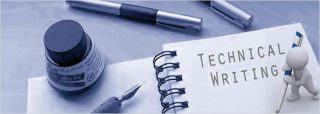 Welcome to the web page of your course Technical Communication! This website is a humble on-going project as part of my modest desire to help you my dear learners become expert communicators. In my desire to transcend the barriers of traditional classroom interaction, I enjoin you to embark on this journey together and we all enjoy the beauty of communicating your thoughts on the world stage. With the growing trend of integrating technology in the field of pedagogy, this initiative serves as my initial tiny steps towards the ultimate goal of seamless and ubiquitous learning that these modern technological advancements bring to our classroom. So, what are you waiting for? Jump in and let’s have fun learning online!
Welcome to the web page of your course Technical Communication! This website is a humble on-going project as part of my modest desire to help you my dear learners become expert communicators. In my desire to transcend the barriers of traditional classroom interaction, I enjoin you to embark on this journey together and we all enjoy the beauty of communicating your thoughts on the world stage. With the growing trend of integrating technology in the field of pedagogy, this initiative serves as my initial tiny steps towards the ultimate goal of seamless and ubiquitous learning that these modern technological advancements bring to our classroom. So, what are you waiting for? Jump in and let’s have fun learning online!
“Writing is not just the technical act of your fingers on the keyboard. Writing is living.” ~ Melissa Mar
What’s in your Technical Communication course?
Course description
This course is an introductory course in developing the critical thinking of students. It focuses on the basic concepts, types and procedures in writing effective business letters, technical reports, and technical articles in a specific field of specialization.
Course objective
This course, Technical Writing, is designed to provide students’ training in the preparation of different reports when they are already in the field. This will have the students demonstrate effective writing skills required in writing technical report and in writing relevant business letters required in their academic discipline.
Course intended learning outcomes (CILOs)
By the completion of the course, the students should be able to:
- write effective technical reports and business letters.
- produce comprehensive and applicable project proposals.
- present confidently the outputs orally.
Student outcomes addressed by the course
The students should be able to:
- articulate and discuss the latest developments in the specific field of practice.
- use the techniques, skills, and modern technology necessary for the practice of the profession.
- function effectively as an individual, and as a member or leader in diverse teams and in multidisciplinary settings.
- communicate effectively in oral and in written English.
- recognize the need for, and prepare to engage in lifelong learning.
Course topics
Prelim Period (Weeks 1–6)
Unit I. Nature of Technical Communication/Writing. Nature and Definition of Technical Writing, Characteristics of Technical Writing; formal and serious impartial and objective factual and accurate practical and powerful, Functions serves as a record, furnishes needed information, procures business through proposals, records what had been done, provides reports to top management and stockholders of companies, gives instructions, Distinction between Technical Report Writing and Creative Writing.
Unit II Basic Principles of Effective Technical Writing. Basic Aspects of Technical Writing, Skills, Technical Documents. End Products. Qualities of Technical Reports, Qualities of a Technical Writer.
Unit III. Basic Techniques in Technical Writing: A. Definition: formal, informal, extended, B. Classification and Partition, C. Description of Mechanism, D. Description of Process, Steps in Writing a Report: Planning, Designing, Collecting Data, Rough Drafting, Revising/Editing.
Midterm Period (Weeks 7–12)
Unit IV. Business Correspondence. A. Nature and Definition, B. Purpose, C. Elements: Sender, Receiver, Message, D. The 7 C’s of Business Letter: Correctness, Clearness, Conciseness, Courtesy, Character, Concreteness, Consideration. E. Parts of a Business Letter: Essential parts, Supplementary, F. Letter Formats, Memorandum, E-mail. G. Kinds of Business Letters: Letter of Inquiry, Order, Claim, Adjustment, and Reply, H. Application Letter: Solicited, Unsolicited, I. Resumé: chronological, skills/functional J. Job Interview: How to Package Oneself for an Interview, Preliminary Interview, Panel Interview, Ten Most Asked Questions During a Job Interview, Do’s and Don’ts during Interview.
Final Period (Weeks 13–18)
Unit V. Proposal Writing. A. Nature of Proposal, Characteristics, Types: Solicited, Unsolicited, B. Preparing a Proposal, C. Proposal Guidelines: Project Summary, Project Description, Title Page, Statement of the Problem, Plan of Action, Management Plan (Gantt Chart, Cost, Qualification for Performing the Proposed Research), Reference Section, Appendices, D. Proposal Oral Defense.
Course references
The reference listed herein are available in the library of TIP Quezon City and mostly available on-line. Our course does not require you to purchase any of these nor download them on-line. You may consult any other references to suit your needs as you are free to explore various resources to complete your technical communication experience.
- Smith-Worthington, Darlene. (2013). Technical Writing for Success Third Edition. Singapore: Cengage Learning Asia.
- Pfeiffer, William Sanborn. (2013). Technical Communication: A Practical Approach. New Jersey: Pearson Education, Inc.
- Abulencia, Efren A. (2014). Fundamentals of Business Communication. Manila: Rex Bookstore.